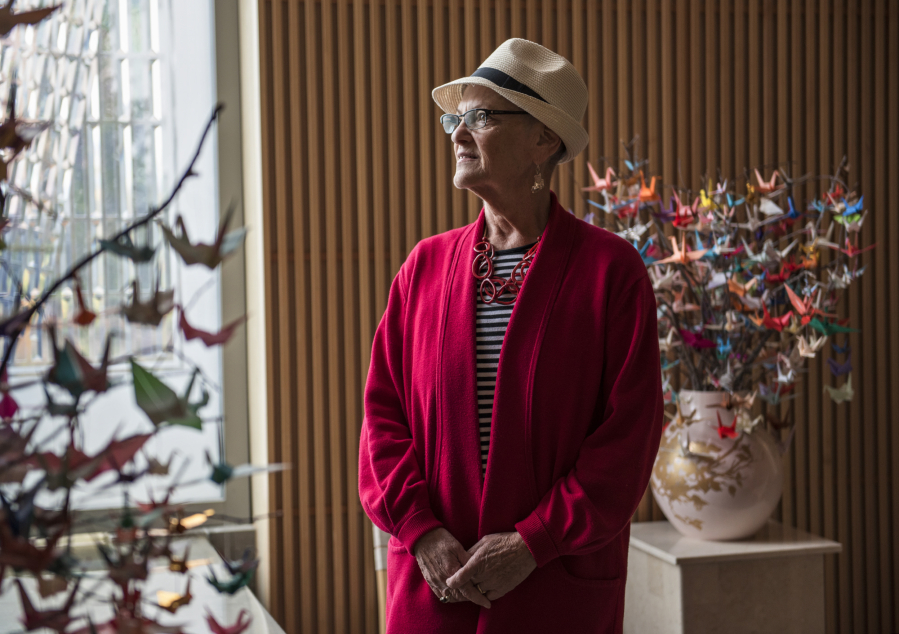Teri Giangreco didn’t know the signs of ovarian cancer until she was sitting in her new gynecologic oncologist’s office discussing her stage 3 ovarian cancer diagnosis.
A poster on the wall listed the four warning signs: bloating, feeling of fullness, pelvic pain and frequent need to urinate.
“We can justify them to be anything,” Giangreco said.
That’s what she had done.
Giangreco, 70, started noticing some mild stomach issues in November — an upset stomach one day, constipation another. Nothing she gave much thought. By December, the problems became more frequent, but she shrugged them off. She hadn’t been eating the healthiest. That must be causing the problems, she reasoned.
But by January, the discomfort was more regular. One Tuesday evening, Giangreco was so bloated she couldn’t get her pants to fasten. By that Saturday, the pain had become unbearable.
Know the symptoms
Ovarian cancer
• Pelvic or abdominal pain.
• Difficulty eating or feeling full quickly.
• Bloating.
• Frequent or urgent need to urinate.
Uterine cancer
• Abnormal bleeding or discharge.
• Postmenopausal bleeding.
• Pressure in pelvis.
Vulvar cancer
• Chronic itching.
• Skin discoloration.
• Bump or lump.
• Pelvic pain.
• Abnormal bleeding or discharge.
• Open sore or ulcer.
Her husband took her to the emergency room, where she was diagnosed with ovarian cancer and referred to Dr. Gina Westhoff, a gynecologic oncologist at Legacy Medical Group in Salmon Creek. A few days later, on Jan. 31, she was sitting in the office looking at the poster outlining the signs for ovarian cancer.
After her diagnosis, Giangreco told every woman she knew about the warning signs. Last week, she spent a couple of hours at lunchtime stopping women as they walked through Legacy Salmon Creek Medical Center and educating them about the symptoms. She shared her story and passed out bookmarks with the warning signs.
“I think it’s unfair to us that there is no test, and there’s not as much education as there needs to be,” Giangreco said. “If I can save one life, then that’s why I’m walking this path.”
Westhoff and the Ovarian Cancer Alliance of Oregon and Southwest Washington joined in the outreach efforts at Legacy Salmon Creek. They hope to educate women not only about the signs of ovarian cancer but also about symptoms and prevention for other gynecologic cancers (uterine, cervical, vaginal and vulvar). September is Gynecologic Cancer Awareness Month.
No test to detect ovarian cancer
Knowing the signs is important, Westhoff said, because there is no screening test for most gynecologic cancers.
“The only screening test we have is the pap test, and the pap test only detects cervical cancer,” Westhoff said.
Cancer is better treated when caught early. But, without screening tests, many gynecologic cancers are caught at more advanced stages, she said.
“It you can catch ovarian cancer at stage 1, there is a 95 percent chance you will live five years,” Westhoff said. Five years is considered “survival” for ovarian cancer.
“At stage 3, which is considered late, that percentage goes down to 39 or 40 percent,” she said.
Many of the warning signs, however, are vague and often ignored, Westhoff said. And because of the organs involved, people often shirk away from talking about the cancers, she said.
“Because these cancers are below the belt and are private organs, they’re not talked about,” Westhoff said. “Thirty years ago, the same was true about breast cancer.”
Talking about the cancers is not only important to make women aware of the symptoms but also to drive research funding to develop screening tests, Westhoff said.
Until those tests exist, though, women need to be their own best advocates, she said. A sentiment echoed by Giangreco.
“I just want people to listen to their body,” Giangreco said. “And maybe go to the doctor a little earlier than I did.”




